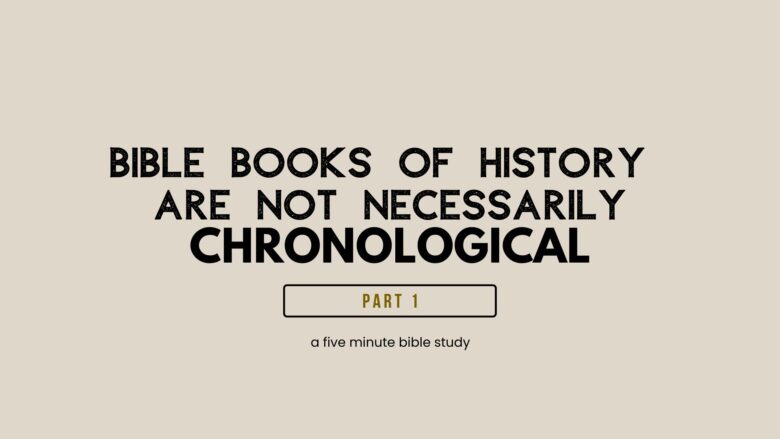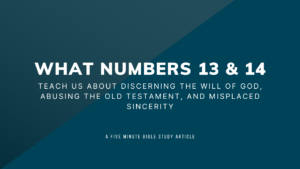Premise: The books of history in the Bible are not always chronological in their reporting of events. The Gospel of Luke does not always report events or details within those events chronologically. Luke 22:17-20 is one of several examples in the gospel where the event is not retold based on a strict chronology.
The Assumption of Chronology
Assumption
“A plain reading of Luke 22:14-23 shows they drank from one cup before eating the bread and then drank from a different cup after eating the bread.”
Critical Points/Questions
1) This position is actually saying, “Chronological (plain) reading shows…” This assumes the priority of chronological sequencing in the book of Luke (and all the gospels for that matter) without first proving this fact (i.e., Begging the Question).
2) The gospels are history, but they are also theology. There is nothing within the historical genre that necessitates the chronological reporting of events. Theological emphasis is often established by repetition, selectiveness, and thematic or climactic arrangement as opposed to strict chronological arrangement.
3) Do gospel writers always use chronological order? Does Luke always use chronological order? Is there anything about the nature of the gospels that demand chronological sequencing?
Unfortunately, it is just assumed that history as a genre is arranged chronologically, but this is simply an assumption. As will be shown momentarily, the gospels are historical accounts, but they do not always stay true to a chronological script. The fact that history does not always prioritize chronology in the retelling of events is manifest in the Old Testament books of history.
Case Studies of Chronology in Bible Books
Cast Study: Genesis
1. Sabbath
Genesis 2:3
Here the text says that God blessed the seventh day and sanctified it. This is confusing when later reading Nehemiah 9:13-14 which says that Moses received the law of the Sabbath on Sinai. This is verified in Exodus 31:12 where Moses gives the Sabbath Law and notes it as a sign of the Sinai Covenant. So, did God sanctify the Sabbath in Genesis 2 or didn’t He? If the reader forces a chronological reading on the historical account then He sanctified the Sabbath in Genesis 2. If the reader realizes that chronology is often forfeited for other motivations, then there is no problem. In Genesis 2 it seems to be Moses’ commentary to his Israelite readers, explaining that the Sabbath Day, ordained in their generation on Mt. Sinai, was based on the seventh day of creation. Moses frequently plugs in explanations of origins throughout his writings (see also Genesis 16:14; 26:33; 43:32; 46:34; 47:26; Exodus 12:42).
2. Adam
In Genesis 1:24-31 Moses recounts the sixth day of creation. In Genesis 2:1-3 he talks about the seventh day with some commentary in v. 3 about God sanctifying the Sabbath. Then in 2:4-7 Moses cycles back around to day six and retells the creation of Adam/man. Many take this to be a “second creation” of man and explain the chronological dilemma with millions of years transpiring between 1:24-31 and 2:4-7. This dilemma is created in the very first place by forcing a chronological sequence on the narrative account of Genesis. There is no dilemma. As Genesis will bear out elsewhere, the book is not restricted by a chronological framework. These seemingly two separate creation accounts are really the same creation account told from two different perspectives: one zoomed out and one zoomed in as it were.
3. Languages
Genesis 10:5 vs. 11:1
In Genesis 10:5 it says that people were separated into their lands according to their language and other criterion. However, the creation of languages isn’t narrated until Genesis 11:1-9. This is impossible if one insists upon strict chronological sequencing in historical documents.
4. Abraham, Jacob & Esau
Abraham dies in Genesis 25 at the age of 175. The birth of Jacob and Esau is not recorded until after the death of Abraham is concluded in the story. Yet Hebrews 11:9 states that Abraham lived in the tents of Isaac and Jacob. Genesis 25:26 says Isaac was 60 when Jacob and Esau were born meaning Jacob and Esau were about 15 at the time of Abraham’s death.
Case Study: Judges
Judges, upon careful examination, is perhaps the best example of a historical book that de-emphasizes chronological sequencing in its retelling of history. Consider the evidence that follows:
1. Joshua
Judges 1:1 vs. Judges 2:1-10
In the first verse of the book of Judges, Joshua is declared dead. But he is resurrected by the second chapter! No resurrection. You would get the impression that Joshua was resurrected if you forced a chronological interpretation on the historical genre, but there is no need to do that: the Holy Spirit confirms the book is not chronologically sequenced with the narrative about Joshua in 2:1-10.
2. Caleb and Othniel
Judges 1:10-19
This story of Othniel capturing Kirjath Sepher for Caleb’s daughter’s hand in marriage is taken right out of the book of Joshua (15:15-19). In the original story in the book of Joshua, Joshua is alive and well. But the Judges account is placed only a couple of paragraphs after the statement, “Now after the death of Joshua…” (1:1). There is no problem in sequencing as long as it’s’ understood that the history of Judges is not arranged chronologically. Joshua really was alive when Othniel captured Kirjath Sepher.
3. The Grandsons of Moses & Aaron
Judges 18:30 & 20:28
The length of the Judges Period is difficult to pin down precisely, but Jephthah states that from the time that Israel captured the Amorite city of Heshbon (Numbers 21:25), which was during the last year of the wilderness wandering, to the time of Jephthah was roughly 300 years (Judges 11:26). Whether or not that is a rounded number or not does not matter for the point being made here. In Judges 18:30, the idolatrous priest of Dan is said to be the grandson of Moses. This is impossible if the book of Judges is chronological. Several generations had already passed since Moses died according to Jephthah (11:26). Furthermore, the grandson of Aaron is mentioned in Judges 20:28 as alive and well. Clearly, Judges 18:30 & 20:28 are placed toward the end of the book of Judges for thematic reasons that trump chronological sequence (Schwab, George. Right In Their Own Eyes. Philipsburg, P & R Publishing, 2011, pp. 7).
Case Study: Samuel
1. The Birth of Solomon
In 2 Samuel 12:24, it seems that Solomon was the first son born to David and Bathsheba after the aborted child from their adulterous affair. However, in 1 Chronicles 3:1-9, Solomon is listed fourth in line of the sons of David by Bathshua (Bathsheba). One of these two texts abandons chronology. Either in 2 Samuel 12:24 the text skips right over Bathsheba’s other three sons to get to the most important of them all—Solomon, or else 1 Chronicles 3:1-9 for some peculiar reasons puts Solomon at the end of the list of sons. Lists typically were ordered from oldest to youngest (though this is not a hard and fast rule). It is my personal opinion that the Samuel passage is the non-chronological account. This is not a problem unless one insists that Samuel is strictly chronological, for which there is no reason to do so.
2. David’s Census
2 Samuel 24
2 Samuel 24 records David’s military census of Israel (see also 1 Chronicles 21). However, in 2 Samuel 23:1 the text says, “These are the last words of David.” Clearly what is then recorded from 2 Samuel 23:1-7 are not the last words of David if the narrative is arranged chronologically. Either the Holy Spirit is lying, doesn’t know what He is talking about, or the text of 2 Samuel 23:1-7 is not arranged chronologically. According to Chronicles, after the census, David goes on to make preparations for the temple in 1 Chronicles 22, commission Solomon to build the temple in 1 Chronicles 28, and then leads a prayer in 1 Chronicles 29. That’s a lot of words following David’s supposed “last words…” 2 Samuel 23:1-7 does indeed record David’s last words, but they are not placed chronologically within the book of Samuel.
Case Study: Kings
2 Kings 13:10-14
In 2 Kings 13:13 Jehoash dies, but in v. 14 he is alive again. In fact, 14:15-16 is almost an identical restatement of 13:12-13. What is the problem with this account? There is no problem, unless you insist that all history is strictly chronologically sequenced.
Case Study: Daniel
Daniel 5-7
The book of Daniel is a book of prophecy primarily, though the first half is interspersed with historical narrative primarily. The narrative portions are not chronologically arranged. If you realize that King Belshazzar was the last king of Babylon and King Darius was the king of the subsequent empire of Medo-Persia, then you will quickly notice that there is a disruption of chronological sequencing between chapters five and seven. Daniel 5:1 starts off with, “Belshazzar the king made a great feast…” Daniel 6:1 begins, “It pleased Darius to set over the kingdom one hundred and twenty satraps…” And in Daniel 7:1, Belshazzar is once again the reigning king. Add to this disruption of chronological sequence the fact that King Belshazzar was slain in Daniel 5:30, but he is alive and well in Daniel 7. What do we make of all this? It’s quite simple. The book is not arranged chronologically.
Conclusion
The evidence in this first part of this three-part series shows that Bible books of history (historical narratives) do not always prioritize chronology in their retelling of events. In the next part, we will examine the book of Luke specifically to see if it follows suit.



